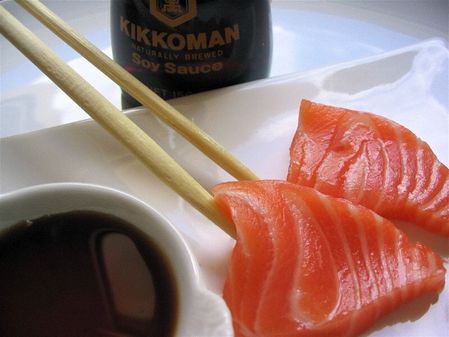
I recently watched Paul Schrader’s 1985 film Mishima – A Life In Four Chapters. The film is a documentary style biographical portrayal of author Mishima Yukio’s final day, interwoven with three highly stylized vignettes of scenes from three of his works, and occasional explanatory flashbacks into Mishima’s past. Below is my brief review of the film, plus alpha.
Review
Seven out of ten stars. The concept and design of the film were unquestionably creative. Schrader took the stylization too far at times, but the exaggeration helped distinguish the vignettes from the main story line, as did filming the flashbacks in black and white. The transitions between the three were smooth enough, but could prove difficult to follow for viewers without any familiarity with Mishima. The connections drawn between specific experiences from Mishma’s life and their later distillation into major themes in his work was well done, and Schrader’s division of the film into four chapters – beauty, art, action, and harmony of pen and sword – further supported these themes.
To Schrader’s credit he shot the entire film, dialogue and narration, in Japanese. The actors in the Kinkakuji vignette even spoke with heavy Kansai accents. No complaints with the score – Philip Glass has yet to disappoint with a documentary soundtrack. Acting generally must be Episode I, II or III execrable for me to take notice so Mishima passes muster. Casting was convincing enough, although Ogata Ken did not much resemble Mishima.
The extra DVD commentary was informative – Schrader had clearly done his homework – and some of the tales about the trials undergone during filming are fascinating. (ex. Death threats from rightwingers lead to clandestine filming efforts and for a while Schrader, afraid of being stabbed, was even wearing a flak jacket. He was later informed by his Japanese crew that as a gaijin, he would not be a target because there was no way he could know better about his actions.)
Sexuality, controversy, and politics
Although nearly twenty years old, the full version of the film has yet to be released in Japan, largely because of a single scene in which Mishima is portrayed drinking and briefly dancing with a young man in a Tokyo gay bar. According to Schrader, he and his crew were initially given full cooperation by Mishima’s wife until he refused to remove said scene. They were also threatened with legal action (and presumably worse) if they depicted anything that could not be substantiated as true. Schrader was able to locate the young man and speak with him about the incident, so the scene could remain, but Mishima’s wife remained intransigent and never returned her support. Consequently, tthe film was not released in Japan at the time of its premier, and to this day the full version including the gay bar scene has yet to be released, distributed, or shown there.
Mishima biographer and former friend Henry Scott Stokes, addressed some of the controversy surrounding Mishima’s sexuality, including the above incident, in his 1974 work, The Life and Death of Yukio Mishima. At the time of Mishima’s suicide in November at the Jietai Eastern Army HQ in Ichigaya, rumors began circulating that Mishima had been lovers with Morita Masakatsu, who killed himself immediately Mishima.
The weeklies ran with these rumors and portrayed the incident as shinju, a double lover’s suicide. In spite of frequent homosexual themes in Mishima’s writings, including the autobiographical Confessions of a Mask, the truth of the matter has yet to be openly proven and probably never will be.
But what is most interesting about the shinju theory is something Stokes wrote in the 1999 epilogue of the book:
Years later I realized that the police, like all officials, were happy to see the homosexual shinju theory enlarge, thereby distracting the press form the politics of the Mishima incident.*
The politics of which he speaks are Mishima’s militant (and I mean this literally—the guy had his own “army”) right-wing leanings, but more importantly the support he received from prominent members of the LDP, including then Prime Minister Sato, then Defense Minister Nakasone Yasuhiro, and then Chief Cabinet Secretary Hori Shigeru. These three men possibly helped finance Mishima’s private army, the Tatenokai, and certainly arranged for them to train with and use SDF facilities for training. But, much like the shinju theory, the truth of this matter, including the full extent of the LDP’s involvement with Mishima, will likely never be known.
A bit of Mishima trivia
I also happened across an interesting nugget of trivia in Stokes book. When Mishima was in his early thirties his mother was (incorrectly) diagnosed with terminal cancer. Fearing that she would die without having seen her son married, he arranged to meet a wife through omiai. Although Mishima eventually settled on the young daughter of a traditional painter, his first meeting was with one Shoda Michiko. A job at Kunaicho awaits anyone who recognized that name without having to look.
Read Mishima’s famous short story “Patriotism” online.
(Note: Above quote taken from pg. 269 of Henry Scott Stokes. The Life and Death of Yukio Mishima. Cooper Square Press, NY. 2000.)


 “Reports that the KMT walks lockstep with the mainland (China) in their anti-Japan campaign do not reflect my real feelings. I even love sashimi!” On the 10th Ma Ying Jiu (mayor of Taipei), chairman of the KMT[Chinese Nationalist Party], Taiwan’s largest opposition party, assembled Japanese reporters resident in Taipei and issued a denial of the viewpoint that he was himself a believer in anti-Japan ideology.
“Reports that the KMT walks lockstep with the mainland (China) in their anti-Japan campaign do not reflect my real feelings. I even love sashimi!” On the 10th Ma Ying Jiu (mayor of Taipei), chairman of the KMT[Chinese Nationalist Party], Taiwan’s largest opposition party, assembled Japanese reporters resident in Taipei and issued a denial of the viewpoint that he was himself a believer in anti-Japan ideology. There are indications that the KMT has been intensifying their anti-Japan tendencies, such as stressing their own role in the Sino/Japanese war. “We criticize even the white terror (of KMT despotic rule) and (China’s) Tainanmen incident from the same basis of human rights and constutituional government. There’s no reason to make an issue out of only Japan,” Chairman Ma Ying Jiu said.
There are indications that the KMT has been intensifying their anti-Japan tendencies, such as stressing their own role in the Sino/Japanese war. “We criticize even the white terror (of KMT despotic rule) and (China’s) Tainanmen incident from the same basis of human rights and constutituional government. There’s no reason to make an issue out of only Japan,” Chairman Ma Ying Jiu said.